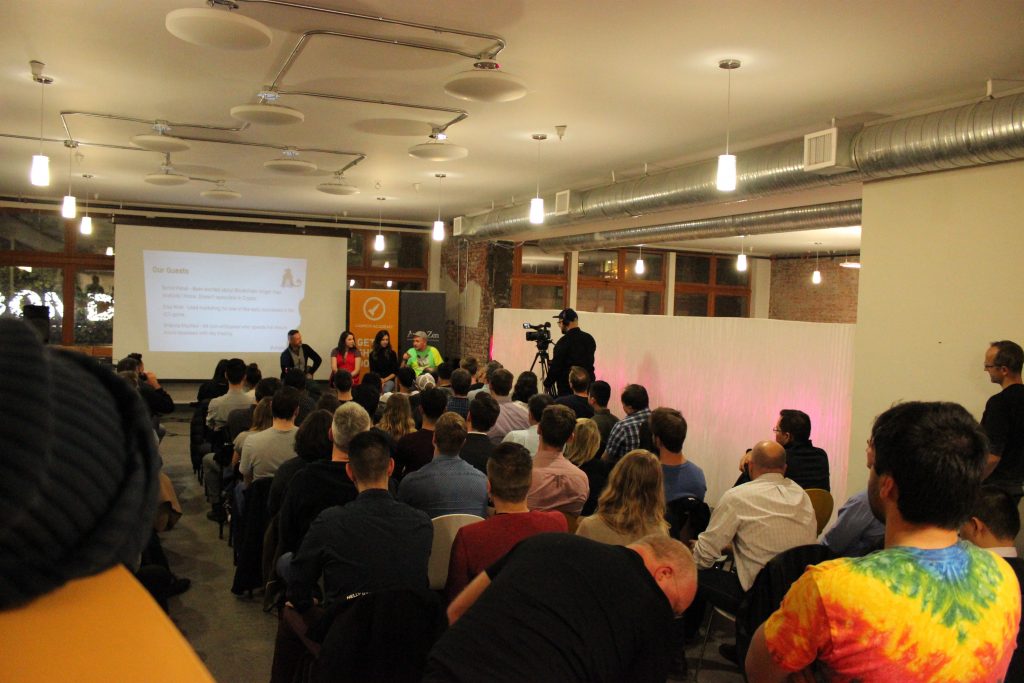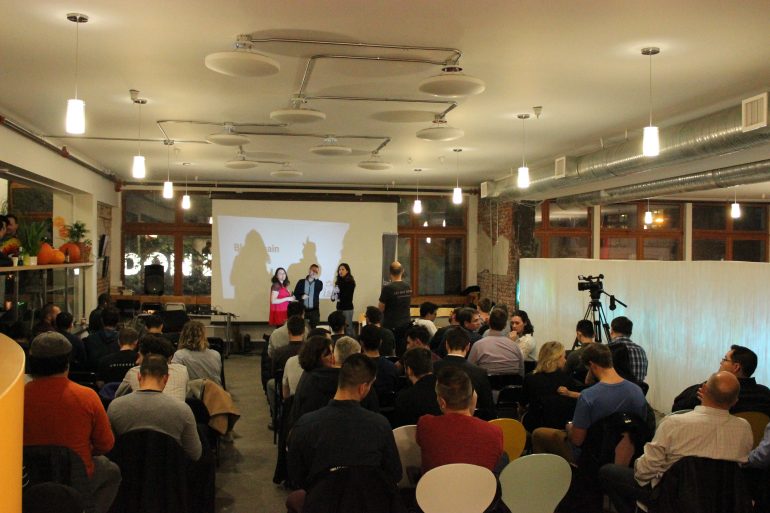As Northmark Ventures partner Bernd Petak prepared for Axiom Zen’s Blockchain Debaters event on October 30, he asked rhetorically on Twitter, “Is it possible to organize a #blockchain event in 2017 and not sell out?”
Later that evening, Petak would be sharing his insights on a pre-debate panel for a sold-out audience interested in the real-world consequences of blockchain. But in this moment, he was merely drawing attention to the astonishing amount of hype surrounding the topic that eight brave souls would debate for 40 minutes in front of founders, engineers, investors, and tech evangelists.
Just how much hype is surrounding the digital ledger technology? In October, a British company called On-line Plc added blockchain to its name, and saw its shares jump 394 percent. On-line Blockchain Plc, as it’s now called, had its largest one-day gain since first being listed in 1996. Closer to home, shares of Mogo recently surged 35 percent on news that they’ll be introducing blockchain tech into their products.

The technology is still nascent, says Axiom Zen’s Mack Flavelle, who acted as emcee and debate moderator.
“There’s a very good chance that the blockchain is going to transform some of the…institutions that we used to govern ourselves and our relationships with each other,” he told me before the event begun. “Why now? Because the world seems to finally be ready for it. I didn’t choose 2017 as the year. I did see the tide rising though. When the tide rises, all boats go up, and you can bet my boat is tied on that.”
Who else is on board? Petak’s co-panelists included Elsa Wilk, a marketing executive that led a $33 million USD ICO (initial coin offering) at Civic Technologies; and Brianna MacNeil, who splits her time between product strategy at BuildDirect and trading cryptocurrencies. “I got Ethereum when it was only $60,” she told the audience.
The pre-debate panel covered reasons for blockchain’s rapid rise (“It’s a huge efficiency play for so many different industries”); its status as a mainstream topic of discussion (“I was standing in the middle of Waves Coffee explaining bitcoin”); and also highlighted the potential shortfalls of cryptocurrencies.
For example, Petak asked another key question during the event: “What good is a store of value if you can’t use it to buy anything of value?” The panelists’ lively discussion set the stage for what came next: seven-rounds of captivating debate, at times both provocative and comical.
The debate progression resembled a knockout-style tournament, with individual debaters going head-to-head. Winners would continue for subsequent rounds.
Ethereum versus bitcoin
The first debate forced experts to consider whether ethereum will be worth more than bitcoin in five years. Chris Rowell, a post-doctoral research fellow at UBC, argued yes. “Ethereum has already passed bitcoin in number of transactions,” he explained. “Ethereum has better use cases. Bitcoin has one thing: it stores value.” His comment echoed Petak’s earlier comment that bitcoin has perhaps lost its primary function as a form of currency.
“Ethereum is truly not decentralized. This is why it will fail in terms of passing bitcoin,” rebuked Adam Dymitruk, CEO of AdapTech Solutions, who made it to the debate final. “The problem with ethereum is that it’s software. Software has bugs.”
Because people often invoke ethereum as an alternative to bitcoin, they sometimes mistakenly refer to it as an altcoin. It’s not. But altcoins were the next topic up for discussion.
Altcoins are here to stay
Nicole Demers, a founding developer at BTL Group, argued that there will be five times more altcoin (trading at least $1 million a day) in two years than today. Her thinking was simple: “$1 million a day in the grand scheme of things — five years from now when lots of people use cryptocurrencie — is not going to be a lot of money,” she said.
“I think automation is killing jobs, destroying homes…it’s a bigger threat.”
Layne Lafrance, product manager at Axiom Zen, countered that there is no incentive for there to be more altcoins. She reasoned that we’ll surely want to focus on a few trustworthy currencies. Demers agreed that there’ll be one major player; however, this won’t stop humans from using other secondary currencies.
“Right now, I hold three currencies that are major world currencies: Japanese Yen, US dollars, and Canadian dollar,” she said. “Just because the Canadian dollar is my primary transactor doesn’t mean I don’t hold other ones.”
Still, Lafrance suggested that the issue with crypto is volatility. “If we create a thousand new altcoins, that increases volatility by a thousand percent,” she said. “The crypto economy will be a lot more accessible to more people if we reduce volatility by having fewer coins and have a couple core coins that work for a lot of people.”
Federally-sanctioned blockchains
Local blockchain expert Dieter Shirley believes (or at least, he argued) that to save blockchain from itself, it needs to be sanctioned by the government.
“What the fuck do we want with a regulated coin?”
“The government is not going to be involved in the blockchain unless they feel like they can stabilize [blockchain currency] the same way they can stabilize fiat [money],” he said.
“And if it’s legal tender, and under the auspices of the government, then guess what, even 7-11 has to take your bitcoin or whatever it is.”
Boris Mann of Frontier Foundry was having none of it. “Trustless. Censorship resistant. Decentralized,” he said. “What the fuck do we want with a regulated coin?” He hinted at what cypherpunks were thinking when they envisioned cryptography and privacy-enhancing technologies in the first place.
Bit-recession?
The final debate followed a pattern from earlier in the evening in that the subject was stated as blockchain, but the conversation inevitably led to discussions of cryptocurrency. The final debate statement: blockchain is going to be the number one cause of the upcoming recession.
AdapTech Solutions’ Dymitruk took the doom and gloom position. “Blockchain is going to disrupt, and disruption means recession, it means resetting, rejoining things, it means inefficiency,” he said. “You don’t get efficiency immediately. There’s a recession before you can collect the bounty on changing a global system.”
Demers, the eventual winner, countered that humans have more grave things to worry about. “I think automation is a much bigger threat to us,” she started. “I think automation is killing jobs, destroying homes…it’s a bigger threat.”
“That timeline is way out there compared to how fast bitcoin and crypto is going up,” responded Dymitruk. “What we’re going to see first is a recession, and then we’re going to get the smart robots driving us around.”
Later in the debate, Dymitruk doubled down: “Things take time to be implemented, and automation takes time. What we see in terms of velocity is disruption and that is going to upset things,” he said, essentially noting that innovation can happen at a pace faster than humans can manage it.
“And that’s why we are going to see a recession because we are governed by dinosaurs. Companies cannot adapt quickly, and governments are even worse than dinosaurs: they adapt even less quickly. So we will see a recession,” he declared.
Demers paused before offering the most simple response of the evening: “Crap,” she said.
Photos via Shade Souc

